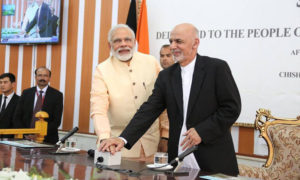
Today, India’s concerns viz Afghanistan is as much geo-political as it is geo-strategic.
N Sathiya Moorthy New Indian Express 11 July 2021
Going by media reports, the American exit from Afghanistan now seems to be more ignominious than from Vietnam decades ago. Else, there is no reason why the US troops should have exited from the Bangram air field in the middle of night, without informing the host-government of two decades. With that they also left behind 5,000 prisoners from the Taliban, which has been taking control of one distant district after another through months of gradual American down-sizing.
It is not unlikely that the Taliban, which has been on the move all over again, would fight for Bagram, if there is any resistance, to have those 5,000 freed. More importantly, they could not let such a military airfield to stay in the hands of the government troops. If it happened, Taliban would be at knocking distance from Kabul, less than 50 km away.
He who controls Kabul alone is considered the legitimate ruler of Afghanistan, though it should also include ‘international recognition’. This time round, if Taliban takes control of Kabul, even if months and years later, will Pakistan and/or China, or any of the latter’s vasal States confer such legitimacy?
To be fair, the post-9/11 American military operations in Afghanistan were justified than the ideologydriven Cold War era engagement in Vietnam. They needed to hunt down Osama bin-Laden, and that they did with great persistence, and billions in burnt dollars. But as always, they did not have a plan for the Day After, and it has taken them a little more than a decade to make a dignified exit. But the American exit has also meant that the Taliban now has the whole of Afghanistan mostly to themselves with no al-Qaeda to share it with. The US thus has done Taliban a service.
From IC 814 to 9/11: To the average Indian mind, the Taliban is linked to the Christmas eve hijack of IC 814 Kathmandu- Delhi Indian Airlines flight in 1999. The Taliban-controlled Kandahar, via Amritsar, Lahore and Dubai, became its revised destination. There were 191 on board, including the five hijackers. The hijackers made their point by fatally stabbing one passenger and injuring many others.
As it became clear, the choice of Kandahar, as different from better-equipped Kabul was precisely for the same reason — that India could have reached rescuers to the Kabul Airport under Afghan government control, but not to the Taliban-held Kandahar. Apart from the humiliation caused by the Vajpayee government having to hand over four terrorists in return for the hijacked aircraft and its hapless passengers and staff, the hijackers’ choice of Kandahar over Kabul showed that 21st century terrorists thought before the act, unlike their emotive brethren since the sixties.
The Kandahar hijack drama had a global message. If it’s India now, that too in a way the regional power was haplessly and hopelessly ‘disarmed’ and unable hit back, it could be any other nation next — but it had to be someone more powerful than India. Under the then prevailing geo-strategic circumstances, it had to be the US. The terror groups could not be seen repeating the same modus, so more daring it would have to be. The 9/11 happened less than two years later in 2001.
Indian concerns: Today, India’s concerns viz Afghanistan is as much geo-political as it is geo-strategic. Through the past years of American draw-down, it has been deliberately kept out of the regional initiative for peace in Afghanistan. The Russian initiative included Pakistan and China, nations adversarial to India, but sharing borders with Afghanistan. It was a clear indication where Moscow’s sympathies lie now.
Both Pakistan and China share borders with Afghanistan, but not Russia. Yet, for Islamabad, using border-sharing with Afghanistan as the yardstick, letting New Delhi in would have meant accepting PoK as an integral part of India. This was because for India, PoK shares border with Afghanistan.
Through the past two decades since the Vajapyee era, New Delhi has successfully shaken off continual American enticements to have Indian boots on Afghan soil. The humiliating American exit now has proved India right — as far as New Delhi’s assessment of regional political and ground-level situations are concerned. For now, the US has acknowledged the India-taught lesson that Pakistan is the fountain-head of international terrorism.
Yet, it is anybody’s guess why Washington continues to venture out in the region on its own, side-stepping the Indian Quad ally. They are not going to understand Sri Lanka or Maldives, Bangladesh or Nepal, any time soon, if they could not comprehend Pakistan and Afghanistan in decades. Still, they continue to do business in the region without New Delhi and at times behind its back — handing over an unpalatable fait accompli to the Indian ally.
For India, the Afghan message is clear, given especially the shaky nature of bilateral ties with Iran in the immediate neighbourhood — whatever be the reasons and circumstances. The Haqqani Network has been targeting Indian diplomatic offices for years now in Afghanistan. Today, with Taliban back in full, if not fuller control, India cannot afford to be lax, nor can it afford to be pro-active — given the complexity of circumstances.
(The writer is Distinguished Fellow and Head-Chennai Initiative, Observer Research Foundation. email: sathiyam54@nsathiyamoorthy.com
